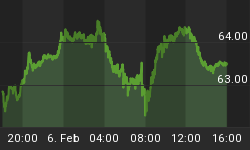For the lazy people who don't like to slog through Hussman's entire data laden weekly tome, I've picked out the most pertinent sections. For the really lazy, I've bolded the most important sentences. When everyone on Wall Street is using the same algorithms in their HFT supercomputers, and John Q. Public isn't even in the market, who will these supercomputers sell to when they all get the sell signal at the same time? When that time comes, and it won't be long, I'll be munching popcorn and watching the festivities unfold. The talking heads, government apparatchiks, and Ivy League educated big swinging dicks on Wall Street will declare a national emergency and demand another bailout. Will we be stupid enough to fall for it again, or will we start hanging bankers?

The higher the price an investor pays for a given stream of expected cash flows today, the lower the return that an investor should expect over the long-term. As detailed below, investors have responded to zero interest rates by driving stock valuations up to the point where expected market returns over the coming decade are also zero. Given that outcome, one is quite free to say that stocks are reasonably valued "relative" to zero interest rates, but one should still expect zero 10-year returns on stocks.
My impression is that's not how investors are thinking. Particularly at market peaks, investors seem to believe that regardless of the extent of the preceding advance, future returns remain entirely unaffected. The repeated eagerness of investors to extrapolate returns and ignore the Iron Law of Valuation has been the source of the deepest losses in history.
Current valuations are above the 2007 peak, and are now within about 15% of the 2000 extreme.
What we haven't seen at any point in history is the combination of dismal projected returns for the S&P 500 coupled with a similarly dismal yield-to-maturity on bonds. The coming decade will be an underfunding disaster for corporate pension plans, endowments, and municipalities, most that still typically plan around an assumed rate of return closer to 8%. The most reliable measures we identify suggest that nominal total returns on a conventional asset mix are likely to be closer to 1% annually. Quantitative easing has already given investors, at least on paper, the gains that they would otherwise have waited years longer to achieve (again, at least on paper). Particularly in equities, investors who do not have a very long horizon and cannot actually tolerate a 50% loss should consider realizing those paper gains now and cutting exposure to a tolerable level. That's not market timing - it's sound financial planning that may be quite overdue. My impression is that the window of opportunity is closing quickly.
Recall that the 2000-2002 and 2007-2009 collapses were accompanied by Fed easing, not tightening. "Following the Fed" would have been disastrous in each case, as the Fed cut rates persistently and aggressively as the market lost half its value. Indeed, the Fed began cutting rates several weeks before the 2007 peak. The Fed also did not tighten within a year of the 1929 peak.
How many investors do you suspect will be available to absorb your shares at current price levels once they begin trying to exit simultaneously?
Look around, and all you'll see are other bulls who share virtually identical beliefs despite the fact that many of those beliefs are contradicted by historical evidence. As I've detailed in recent weeks, stocks have been in a clear price-volume distribution pattern for nearly a year. The NYSE Composite has gone nowhere since last July, while the Dow and S&P 500 are back to their late-December levels. Soon, the only ones who will be available to take the buy side against sell orders are, well, value investors like me, and we don't see value anywhere near current levels. The rule is simple. Once market internals have deteriorated, the exit rule for bubbles is that you only get out if you panic before everyone else does.
Frankly, history suggests that a rather ordinary completion to the present market cycle would involve the S&P 500 losing more than half of its value.
Based on the combination of obscene valuations and increasing deterioration across a wide range of market internals, our outlook remains hard-defensive here.
At present, market losses that may seem like "worst case" scenarios are actually quite run-of-the-mill expectations. As Santayana wrote, "Those who do not remember the past are condemned to repeat it."















